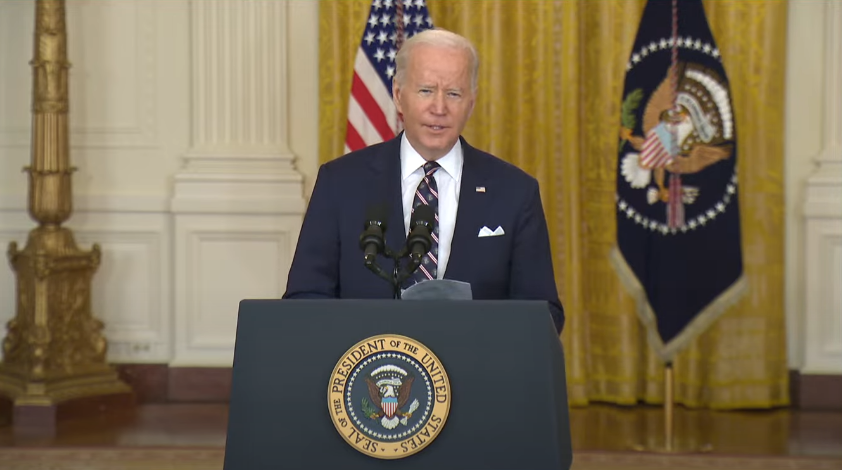Biden Announces First Russian Sanctions, Warns Of Larger Invasion
United States President Joe Biden warned on Tuesday that the Russian deployment of troops to separatist-held areas in Eastern Ukraine was “the beginning of a Russian invasion of Ukraine”.
In an address at the White House, Biden warned that Russian President Vladimir Putin was “setting up a rationale to go much further” with his recognition of the self-declared Donetsk and Luhansk People’s Republics, and the subsequent deployment of troops to the areas on a so-called “peacekeeping” mission. “Who in the Lord’s name does Putin think gives him the right to declare new so-called ‘countries’ on territory that belonged to his neighbors?” Biden said. “This is a flagrant violation of international law and it demands a firm response from the international community”.
The President announced a “first tranche” of American sanctions during the address, targeting the Russian VEB bank and the Promsvyazbank military bank, as well as “comprehensive sanctions” on trade in Russian sovereign debt that Biden said would cut off the Russian government’s ability to raise funds on Western financial markets. Additionally, five members of Putin’s “inner circle” have been sanctioned, with Biden saying that sanctions on additional members of the Russian elite and their family members were coming in the following days.
Biden said that the new sanctions went far beyond those imposed in 2014 in response to the Russian invasion and annexation of Crimea, adding that the U.S. and its allies “stand prepared to go further” should Putin proceed with an invasion, citing coordination with Germany over Berlin’s announcement earlier on Tuesday that it would be halting certification of the Nord Stream 2 gas pipeline. The move, announced by German Chancellor Olaf Scholz, effectively freezes the controversial pipeline in response to what Scholz called a “grave breach” of international law.
The President also announced the repositioning of American military personnel currently in Europe to Latvia, Estonia and Lithuania, stressing that the move was “totally defensive” and the U.S. had no intention of fighting Russia. Defense officials have subsequently indicated that the movements will see the redeployment of around 800 infantry from Italy to the Baltics, eight F-35s from Germany to “several” locations “along NATO’s eastern flank”. 20 AH-64 Apache attack helicopters currently based in Germany will be deployed to the Baltics, while 12 currently in Greece will be sent to Poland.
Despite his assessment, Biden stated that there was “still time to avert the worst-case scenario”, adding that “I’m hoping diplomacy was still available”.
The European Union also revealed on Tuesday its initial sanctions package, targeting the 351 members of Russia’s State Duma that voted in favor of Russian recognition of the “People’s Republics”, 27 individuals and entities, “who are playing a role in undermining or threatening Ukrainian territorial integrity, sovereignty and independence”, as well as the “economic relations” between the EU and the separatist-held territories. Like the U.S., the EU has also moved to “limit” the trade of Russian sovereign debt in EU financial markets, with EU foreign policy head Josef Borrell saying that it was a “very important” move.
Prior to Biden’s speech, Putin had confirmed in an address that he recognized the entirety of the Donetsk and Luhansk People’s Republics’ claims to Ukraine’s Donetsk and Luhansk regions, after initially conflicting statements from Russian lawmakers and the Russian foreign ministry about whether he would recognize their de facto borders or their claimed borders. Regional observers consider the latter to be a pretext for a larger invasion, as Kyiv has remained in control of two-thirds of both regions since before the signing of the second Minsk Agreement in 2015.

